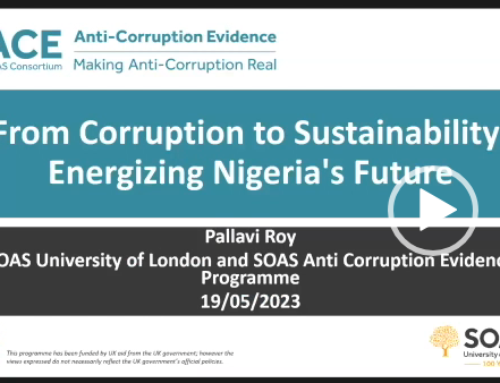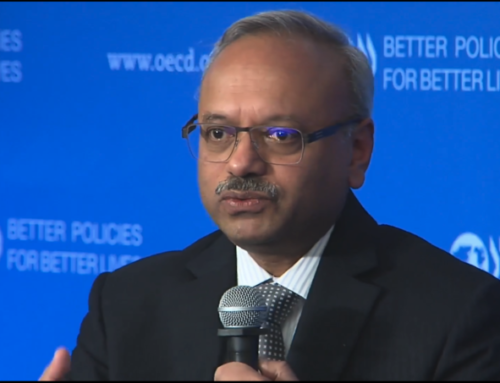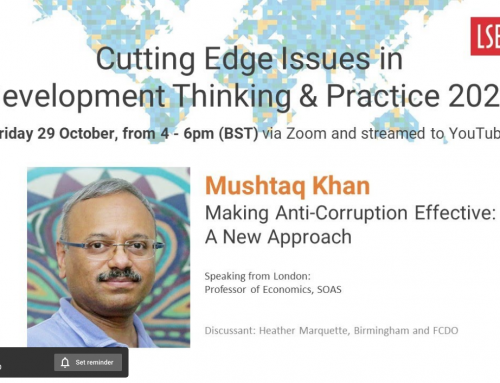As the dust settles following COP26 in Glasgow and the world reflects on what was, and was not achieved, it is clear that climate finance is going to be a critical factor in whether countries around the globe are able to make the necessary shifts to meet the goals of the Paris Agreement. Developed nations have, so far, failed to make the promised $100 billion a year target of climate finance available to developing nations. Given this, it is going to be important that developing nations are able to make (and demonstrate) effective use of the climate finance that is available.
This energy transition is also a significant governance problem. Any transition including the one to the green economy implies costs and benefits across various segments of society and issues of distributive justice—a just transition in this case—have to be considered. The need to ensure this is achieved without damaging distortions or capture makes anti-corruption an important feature of climate justice. Solutions have to keep in mind the relative power, incentives and capabilities of affected players. For most developing countries dependent on extractive sectors this makes thinking through the political economy of a just transition even more critical.
The SOAS-ACE team has reflected on what our work can tell us about effective and feasible anti-corruption strategies to reduce leakage and corruption in climate initiatives. We have collated a number of relevant resources which provide pointers of where there are opportunities for effective anti corruption:
Climate Adaptation Projects:
Often suffer from high levels of corruption. In Bangladesh, around 35% of funds are estimated to be lost. Our research shows that corruption can be significantly reduced by creating immediate material incentives for local communities to engage in monitoring. For instance, we show how strong ‘dual-use’ benefits (embankments used as roads or cyclone shelters as schools) induce local influential people to ensure corruption was controlled and build quality improved. The research shows how feasible improvements in the design of climate adaptation projects can reduce corruption.
- Climate change investments in Bangladesh: leveraging dual-use characteristics as an anti-corruption tool (Working Paper)
- Win-win: Designing climate change projects for effective anti-corruption in Bangladesh (Blog in Oxfam Poverty to Power and Global Policy)
Private Power Projects:
High risks in power projects drive out politically unconnected firms and allow massive collusion by politically connected companies. Result: high prices and dirty technologies. Procurement rules fail if only connected companies bid. We show that an effective anti-corruption strategy is to provide concessional financing accessible to any bidder (and not linked to one supplier). Comparing 58 projects over a decade in Bangladesh we show that this reduced prices by 26%, implying a huge reduction in collusive mark-ups, and greener technologies. The potential entry of unconnected bidders made procurement effective, reduced corruption and improved technical compliance. This shows the importance of getting the design of green financing right to reduce corruption in high-risk environments.
- De-risking private power in Bangladesh: How financing design can stop collusive contracting (Journal article)
Private Power Projects when the grid is bankrupt:
Here concessionary financing alone will not suffice to attract politically unconnected companies to sell into the grid without longer-term reforms to retire bad debt. Our research in Nigeria focused on SMEs that have responded to supply constraints by using diesel generators and bribes to get illegal diesel and power supplies. We show that disaggregated grids in SME clusters using CNG (or eventually solar) will be less corrupt and greener. Green financing therefore also has to be designed to address specific corruption problems.
- The potential of small and medium enterprises: Off-grid solutions to corruption in Nigeria’s electricity sector (Briefing Paper)
- Breaking the cycle of corruption in Nigeria’s electricity sector: a political settlements analysis (Working Paper)
Addressing severe environmental damage in high corruption areas:
The Niger Delta ‘artisanal’ oil industry involves local communities processing stolen crude because alternative opportunities do not exist. The irony here is that oil corporations have destroyed the environment so traditional employment opportunities like fishing are scarce. Communities now have resorted to the same fossil fuel production to sustain them. This very local context has to be understood before policy can be designed and the principles of a just transition become key.
Conventional top-down enforcement approaches that further criminalise such activities fail and can do more damage where corruption is ‘networked’ and local communities collectively benefit. Multi-pronged responses are required to address theft and environmental damage here, including developing solar alternatives and linking this to SME job opportunities.
Our short film: The networked economy of the artisanal oil industry in the Niger Delta






